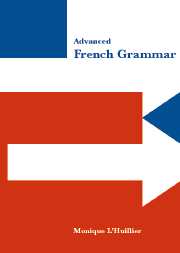Book contents
- Frontmatter
- Contents
- Acknowledgements
- Introduction
- 1 Framework
- 2 Verbs
- 4 Introduction to verbs
- 5 Present indicative
- 6 depuis and other tense markers
- 7 Future
- 8 Imperfect
- 9 Perfect
- 10 Past historic
- 11 Other past tenses
- 12 Subjunctive
- 13 Conditional and the expression of hypothesis
- 14 Imperative
- 15 Infinitive
- 16 Present participle
- 17 Past participle
- 18 Active and passive voices
- 19 Impersonal verbs and the impersonal voice
- 20 Pronominal verbs
- 21 Modals: devoir, pouvoir, vouloir
- 22 savoir and connaître
- 3 Determiners and prepositions
- 4 Nouns, pronouns and modifiers
- 5 Sentences and text
- Appendixes
- Bibliography
- Index
11 - Other past tenses
Published online by Cambridge University Press: 05 June 2012
- Frontmatter
- Contents
- Acknowledgements
- Introduction
- 1 Framework
- 2 Verbs
- 4 Introduction to verbs
- 5 Present indicative
- 6 depuis and other tense markers
- 7 Future
- 8 Imperfect
- 9 Perfect
- 10 Past historic
- 11 Other past tenses
- 12 Subjunctive
- 13 Conditional and the expression of hypothesis
- 14 Imperative
- 15 Infinitive
- 16 Present participle
- 17 Past participle
- 18 Active and passive voices
- 19 Impersonal verbs and the impersonal voice
- 20 Pronominal verbs
- 21 Modals: devoir, pouvoir, vouloir
- 22 savoir and connaître
- 3 Determiners and prepositions
- 4 Nouns, pronouns and modifiers
- 5 Sentences and text
- Appendixes
- Bibliography
- Index
Summary
Introduction
The pluperfect, past anterior and double compound past are the compound forms of the imperfect, past historic and perfect respectively. They have been put together in this chapter so that their uses can be more easily compared with one another.
The pluperfect
The pluperfect (plus-que-parfait) is the compound form of the imperfect.
Formation
The pluperfect is formed with the imperfect of the auxiliary être or avoir plus the past participle of the verb to be conjugated, and corresponds to the English past perfect ‘I had done’, or past perfect continuous ‘I had been doing’.
Ex: Ils avaient mangé.
They had eaten / They had been eating.
J'étais revenue.
I had come back.
Uses
The relation between the pluperfect and the imperfect is the same as that between the perfect and the present insofar as both the pluperfect and the perfect are compound tenses. See also chapters 6 depuis and Other Tense Markers, 8 Imperfect, 13 Conditional and 41 Reported Speech.
The pluperfect to express anteriority
Like the English past perfect, the pluperfect is used to relate a past event, action or state which took place prior to another event, action or state which happened further back in the past. Hence it is used to express anteriority, in conjunction with the past historic or the perfect. The past action is sometimes merely implied.
Ex: Catherine arriva en retard; son réveil n'avait pas sonné.
Catherine arrived late: her alarm-clock had not rung.
- Type
- Chapter
- Information
- Advanced French Grammar , pp. 148 - 152Publisher: Cambridge University PressPrint publication year: 1999



